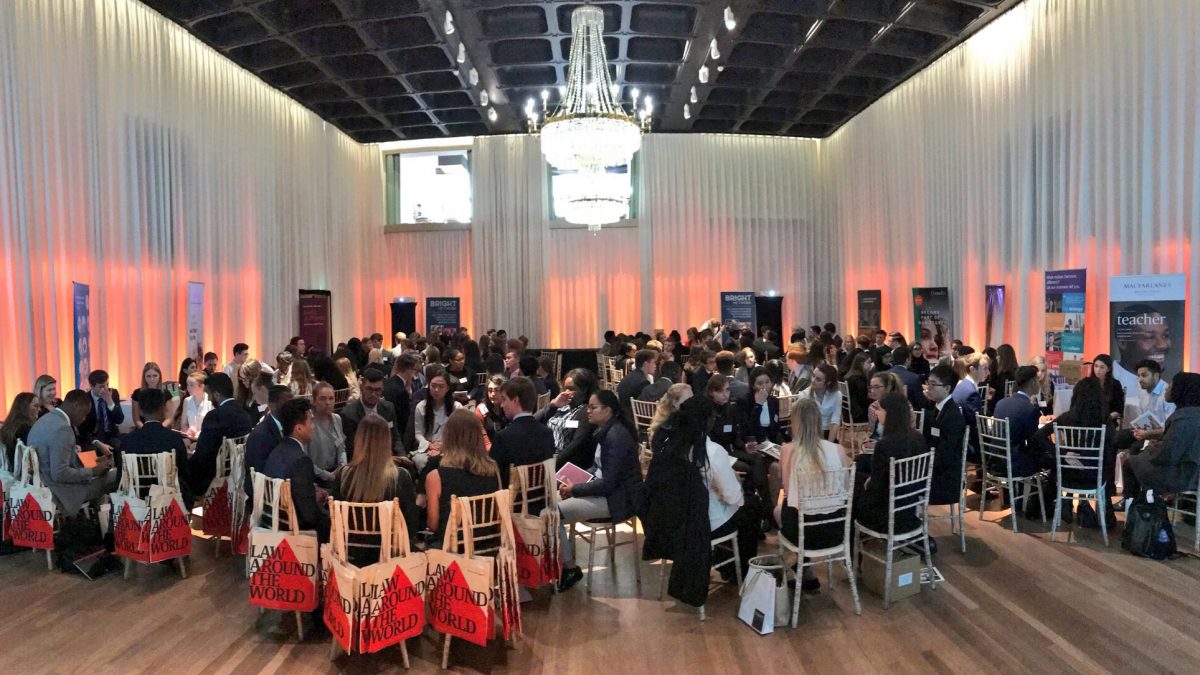
Diversity in the English Legal System
September 27, 2018
Interview with University of London Law Society
October 16, 2018Bright Network is known for connecting students and graduates to opportunities in their desired fields. They put on various events throughout the year – such as the Bright Network Festival and the Women in Business event. On September 12th, I attended the Bright Network First Year Lawyers Top 100. This offered 100 first year Law students wishing to find work after university in the field of Commercial Law the opportunity to listen to panels and attend a structured networking session to glean more information about the headlining law firms, all of which were relatively large profile City Law firms.
The Bright Network events are free, but even if they weren’t, I would say they are worth attending. The day started with success stories – a recent graduate with a contract at Linklaters, and a third year Law student who had attended Bright Network events in the past. They discussed how they have succeeded in their careers thus far, what they are involved in and what they want to do, etc. This was followed by a panel which saw current lawyers of various ranks from the firms answering questions about interviews and the qualities they look for, as well as advice for new trainees.
Today we are at the @brightnetwork First Year Lawyers event in London – looking forward to meeting everyone to talk about #TeamOC pic.twitter.com/wcD0A3jsPG
— OC Trainee (@OC_Trainee) September 12, 2018
The structured networking session involved students being put into groups and then moving around the room after a set amount of time with each firm. This gave us an opportunity to ask questions and get some information from the trainees and other employees on the firms’ inner workings. This was a good chance to demonstrate research and ask focused questions, in addition to learning about working at the law firms from those employed there.
I found that this particular type of networking was important, not only to make sure I was getting used to opening up channels of conversation, but also for finding out information that couldn’t be discovered from the internet alone. At the same time, though, the nature of being in groups led around to different trainees meant the pressure of having to approach people and be the first one to talk was off.
Application Process
The Bright Network events do need to be applied for, but the application process is fairly straightforward – you just need to send in your CV and complete the form on their website (not currently open). I would recommend tailoring your CV to the opportunity, as you would to any job or opportunity, because as far as I know it was quite a competitive programme.
How I Prepared
I – and, it seems, most of the people around me – prepared by researching the firms and putting together profiles. This will doubtless be useful to me in the future during vacation scheme and training contract applications. During this research period, I looked up:
- The mission statement;
- Recent news of the companies;
- Major clients;
- The hiring process of each firm (which I put into a spreadsheet detailing the steps to being hired and the requirements of each);
- CEO and top management names.
I also compiled a short list of questions for each firm and topics I could mention in conversation. Then, I wrote this information down on a small notepad in shorthand. I kept a more detailed document in Google Docs on my phone so that I could refer to it if I needed, but I found I had more than enough on the notepad to get me through the day.
What I Learned
Between the two panels and talking to the trainees, I learned a lot from the day overall. I’ve compiled a list below of what I feel were some of the more important takeaways from the day.
Understand what you want to get out of your career, and what you value, before you start looking into firms. It’s integral to know what area you want to go into, as well as what culture you want a firm to have before you look into them, so you’re looking at the ones that you match with and will be happy in.
Try out other areas while you’re at university so you have as much experience as possible and a certain idea of what you want to do. Also try out extracurriculars, but only those you have a genuine interest in, and don’t allow them to infringe too much on your academics.
Legal work experience isn’t the be-all and end-all – you can pick plenty of transferable skills from a Saturday job or any part time work or volunteering. You will probably need some form of experience that proves you can take initiative. It should also help you build skills like communication and teamwork, but you don’t always have to have worked in a law firm before. Although, a lot of people will have, so if you can get it, I would advise it.
Start networking early. Build your personal brand, your own contacts and relationships as early as possible because it will benefit you your whole career.
Communication is absolutely vital, so you have to develop your communication and teamwork skills from early on (hence why extracurriculars are important).
Was the Bright Network event Worth it?
In my opinion, the event was absolutely worth it. I learned a lot about furthering my career and creating a “personal brand,” and it eased me into networking in a hands-on way that I feel would have been difficult to get elsewhere. Furthermore, it’s a good opportunity to get to know other students of different backgrounds and on different paths – some people were set on commercial law, others were surveying their options before starting university. There was even someone in attendance who would be on my course. Applications open in summer; if you get the opportunity, I definitely recommend you go if you are able (the event itself is free, but you’ll have to pay for transport to the venue, etc.), for the advice and information on the firms’ cultures and hiring processes, if nothing else.
Firms in Attendance:
- Addleshaw Goddard
- Clyde & Co LLP
- Macfarlanes
- Reed Smith
- Slaughter and May
- Osborne Clarke
- Norton Rose Fulbright





